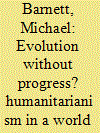| Srl | Item |
| 1 |
ID:
092083


|
|
|
|
|
| Publication |
2009.
|
| Summary/Abstract |
Many theories of international relations contain a narrative of progress and explain that progress with reference to evolutionary imagery. This article examines critically: the relevance of Darwinian and Lamarckian models of international relations to the evolution of international ethics and institutions; and the possibility that the ethics and norms are likely to be more consistent with existing world orders than challengers to it. Specifically, this article draws from evolutionary social science and organizational theory to develop a framework to explore the initial diversity of the meaning and practices of humanitarianism; how the combination of environmental mechanisms and organizational culture led many humanitarian agencies to adapt to their environment in ways that incorporated politics; and the subsequent countermovement by some agencies who wanted to purify humanitarianism. I then apply this framework to explain the recent history of four international aid agencies. I conclude with several observations regarding how the model as applied to these cases allows us to examine critically the selection mechanisms that do and do not account for ethical change and how scholars of international norms, ethics, and progress should be attentive to how principled actors are creatures of the world they want to transform.
|
|
|
|
|
|
|
|
|
|
|
|
|
|
|
|
| 2 |
ID:
111920


|
|
|
|
|
| Publication |
2012.
|
| Summary/Abstract |
A great deal of foreign policy analysis relies on social and environmental factors, or anecdotal evidence. In seeking to address this problem in a more systematic manner, we move from an investigation centered around state actors to one focused on variation in individual behavior account for the combination of social, cultural, environmental, psychological, and biological differences. Our proposed approach to the study of political violence requires the integration of methods and skills from geneticists and neuroscientists with those in the behavioral and social sciences. Specifically, we seek to introduce an approach to study political violence which : (i) quantifies the effects of genes, environments, and their interaction on behavior; (ii) identifies specific genetic and environmental contexts that lead to such behavior; (iii) develops a comprehensive model of the biological and social pathways to political violence; (iv) identifies populations under specific circumstances which pose a higher or lower prevalence for any specific genes, neurobiological or environmental mechanisms which pose an increased liability for political violence; (v) develops mechanisms to identify individuals within given populations who are most at risk for committing violence, as well as those most resistant to such action; and (vi) creates environmental responses which can mitigate risk among those individuals.
|
|
|
|
|
|
|
|
|
|
|
|
|
|
|
|